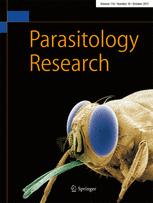Cloning, expression, characterization, and immunological properties
of citrate synthase fromEchinococcus granulosus
Ning Wang, Hui Zhu, Jiafei Zhan, Cheng Guo, Nengxing Shen, Xiaobin Gu, Weimin Lai, Yue Xie, Xuerong Peng, Guangyou Yang

Abstract
The larval stages of the tapewormEchinococcus granulosus(Cestoda: Taeniidae) are the causative agent of cystic echinococcosis, one of the most important parasitic zoonoses worldwide.E. granulosus has a complete pathway for the tricarboxylic acidcycle (TCA), in which citrate synthase (CS) is the key enzyme. Here, we cloned and expressed CS fromE. granulosus (Eg-CS)and report its molecular characterization. The localization of this protein during different developmental stages and mRNAexpression patterns during H2O2treatment were determined. We found that Eg-CS is a highly conserved protein, consisting of466 amino acids. In western blotting assays, recombinant Eg-CS (rEg-CS) reacted withE. granulosus-positive sheep sera andanti-rEg-CS rabbit sera, indicating that Eg-CS has good antigenicity and immunoreactivity. Localization studies, performed usingimmunohistochemistry, showed that Eg-CS is ubiquitously expressed in the larva, germinal layer, and adult worm sections of E. granulosus. Eg-CS mRNA expression levels increased following H2O2exposure. In conclusion, citrate synthase might beinvolved in the metabolic process inE. granulosus. An assessment of the serodiagnostic potential of rEg-CS based on indirectELISA showed that, although sensitivity (93.55%) and specificity (80.49%) are high, cross-reactivity with other parasitesprecludes its use as a diagnostic antigen.
copyright:© Springer-Verlag GmbH Germany, part of Springer Nature 2019.
Parasitol Res (2019). doi:10.1007/s00436-019-06334-6
Read Full Text: https://doi.org/10.1007/s00436-019-06334-6
